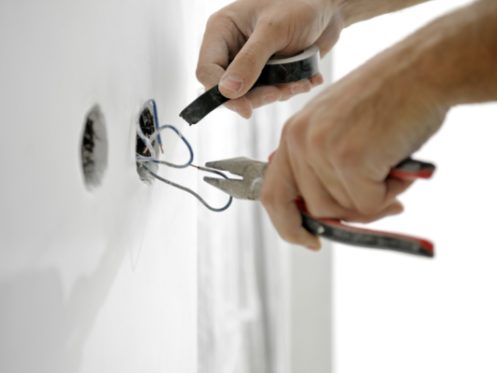Whether you’re a first-time homeowner or you’ve been in your home for a long while, you may have some questions about your home’s electrical system. It’s important that you take the time to understand some basic knowledge about the power in your home so that you can safely work on and around it.
What’s the Difference Between a Fuse and a Circuit Breaker?
When you look into buying a home for the first time, one thing that many experts will recommend is to ensure the home has circuit breakers instead of fuses. Both of these items are located in the panel box that will be found in the basement or utility room. The most common of the two is the circuit breaker, which became standard in homes starting in the 1960s.
Circuit breakers look like switches that have ON and OFF positions. Whenever you overload a power circuit in your home, a circuit breaker will trip. You’ll simply need to locate the tripped breaker, turn it off, and then turn it back on again. A fuse, on the other hand, will actually blow out when it’s tripped due to a power overload. The blown fuse must be physically replaced by a fresh one to get that circuit back up and running.
What’s a GFCI Outlet?
If you take a look at the outlets throughout your home, you’ll likely notice that there are two main kinds. There are outlets where both of the receptacles are oval-shaped, which are the most commonly used. The second type of outlet has a square shape with a Test and a Reset button between the receptacles. These are referred to as GFCI outlets.
GFCI stands for ground-fault circuit interrupter. You’ll find these outlets in bathrooms, kitchens, unfinished basements, and anywhere in a home that is close to water. Unlike the regular oval-shaped outlets, GFCI outlets are specifically designed to trip in the event that water comes into contact with them. This works to prevent any risk of electrical shock to a person touching the outlet while water is present.
If your home doesn’t currently have GFCI outlets in wetrooms, you should highly consider adding them. They can help to provide peace of mind and keep your family safe from accidental electrocution. While you may be thinking about upgrading GFCI outlets on your own, that’s not the best option unless you have in-depth knowledge of electrical wiring. Rather, you should contact an electrician who has the knowledge and experience to ensure that your new GFCI outlets get wired up correctly so that they work right.
Why Does a Light Switch Control My Outlet?
One very frustrating problem, especially when you first move into a home, is having an outlet that doesn’t seem to work. You end up hitting various light switches, and suddenly the outlet works. Why would a light switch control an outlet? The most common explanation is simply that the homeowner did some DIY wiring and wasn’t mindful of the order of the electrical installation. While this isn’t necessarily a problem, it can be a real nuisance. It can be very helpful to have a licensed electrician rewire the outlet so that it has power regardless of whether the light switch is turned on.
Why Do My Lights Flicker?
Another annoying problem that your home may have is flickering lights. This will be most noticeable when an appliance kicks on. For example, when you turn your dryer on, you may notice that your lights flicker. This is a key indication that too much power is being drawn by the dryer for that electrical circuit.
Simply using another electrical circuit to power your dryer can solve this power draw problem. If it doesn’t, then you’re likely dealing with an outdated electrical system that will need to be upgraded to meet your current electrical needs. If you notice that your lights only seem to flicker when it’s windy outside, it’s a key indication that the weatherhead where the power connects from the street to your home is damaged. You’ll need to call in a professional to fix this particular issue.
Why Is My Light Switch Hot?
It’s crucial to realize that your light switches and outlets should never be hot to the touch. When this happens, it indicates that there’s a serious problem. The issue could be faulty wiring, a malfunctioning switch, or an overloaded circuit. It’s best to turn the light switch off and contact a licensed electrician to further assess the issue. In this case, delaying repair work could end up leading to an electrical fire.
What Are AFCI Breakers?
AFCI breakers are simply a safer version of conventional circuit breakers. AFCI stands for arc-fault circuit interrupter. In addition to protecting you from short circuits and overloads, AFCI breakers are specifically designed to protect against fires caused by arcing faults present in your electrical wiring. An arc is sparking that is a result of a loose electrical connection or faulty wiring. Most local codes will require that newer homes have AFCI breakers installed in every bedroom.
Why Does My Circuit Breaker Constantly Trip?
While it’s not uncommon for a circuit breaker to trip from time to time, it shouldn’t be happening on a consistent basis. If you find that your circuit breaker is constantly tripping, it’s likely an indication that you have a power-hungry appliance on the circuit. You’ll want to contact a licensed electrician to upgrade the amperage going to that circuit so that it can adequately power your appliances without tripping the circuit breaker.
Why Are My Light Bulbs Constantly Blowing Out?
One really annoying issue that you may find yourself dealing with is a light that constantly blows out the bulb. In most cases, you’ll find that the bulb blows out due to overheating. This can be an indication of a severe issue that should be addressed by a licensed professional. You never want to let a problem like this go on as it can be a real fire hazard for your home.
Can I Use Extension Cords and Power Strips?
If you reside in an older home, one problem that you’re likely dealing with is a lack of outlets. Your first thought may be to grab some extension cords or power strips to help provide power where you need it. In general, it’s best to invest in a quality electrician who can add outlets to the various rooms throughout your home. This is the safest option.
However, you can get away with using power strips and extension cords if you’re mindful of how you do it. Always invest in heavy-duty power strips and extension cords. Any option that you’re thinking of purchasing should have a gauge rating. You’ll want to ensure that you purchase extension cords and power strips that are at least 14-gauge or thicker. The lower the number, the thicker the wire. Undersized wires, such as 16-gauge power strips, have the potential to overheat and start a fire.
Professional Electrical Services
Huft Home Services offers professional electrical services to the entire Sacramento, CA, community. We can also assist with all of your cooling, heating, plumbing, insulation, indoor air quality, and home performance needs. Give our office a call today to get the professional assistance that you need for your home.




